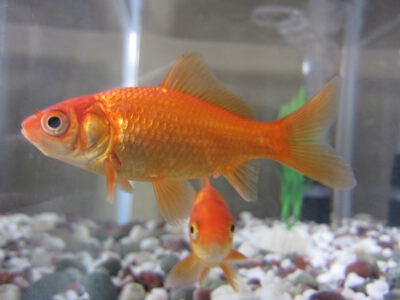Handbook of Freshwater Ornamental Fishes of Kanyakumari
Fishes that are kept in home aquariums for aesthetic purposes are considered ornamental fish. These fishes include a wide variety of species, of many shapes, sizes, and colors. The common freshwater ornamental fishes of Kanyakumari District are as follows.
1. Gold Fish
Scientific Name: Carassius auratus
Common Name: Gold Fish
Colouration: Bright orange, Yellow, Red.
Feeding: Prefer aquatic plants, insects, larvae, crustaceans, and other smaller fishes
Breeding season: April to August, when the weather is warmer.
Life span: 10 years
Behavior:
- Goldfish are not aggressive.
- They generally can be found in slow-moving and freshwater bodies of water in the wild.
- They can also thrive in slightly sludgy water, live their close relative the carp.
- They can thrive in a pond environment.
Advantages:
- Easy to maintain
- Cheap and available everywhere
- Reduce stress and anxiety
- Adapt to climatic changes
- Angel Fish

Scientific Name: Pterophyllum
Common Name: Angel Fish
Colouration: Silver in colour with a slight brown tinge and four black vertical stripes
Feeding: Feeds on flakes, pellets, shrimps, daphnia
Breeding season: Reach sexual maturity at 6th month and breeds at a temperature of 80º
Life span: 12-15 years
Behavior:
- They are fearful and get nervous easily by loud noises and sudden moves.
- They are quite aggressive if they are not kept with the right species.
- Usually peaceful fish but tend to become territorial at the time of breeding.
- They prefer middle of the tank and are known to be active swimmers.
Advantages:
- Reduce stress and anxiety
- Gives esthetic pleasure to the aquarium
- Can thrive within a small tank
- These fishes are a lovely sight to behold when they swim elegantly in an aquarium.
- Gourami
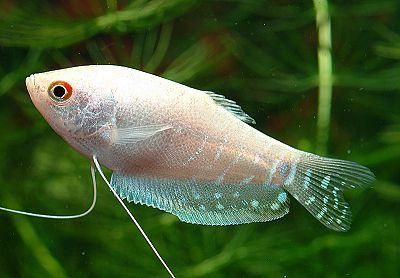
Scientific Name: Trichopodus leerii
Common Name: Gourami
Colouration: Diagonal stripes or spots of alternating blue and red colors
Feeding: Larvae, small insects, eggs, and algae
Breeding season: Breeds during warmer at a temperature of 77°F to 82°F
Life span: 3-5 Years
Behavior:
- Male have a tendency to be aggressive
- Slow moving and are best kept with similar sized fish
- They are less stressed
Advantages:
- They demand mid-level care and are of peaceful temperament
- Easy to keep and extremely adaptable
- Provides extra beauty to the aquarium.
- Tetras
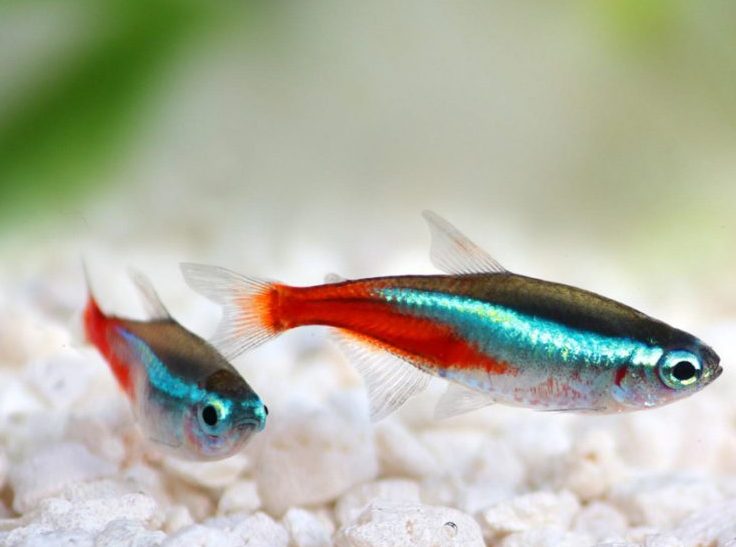
Scientific Name: Moenkhausia pittieri
Common Name: Tetras
Colouration: Pure silver with slight red coloration around the top of their eyes.
Feeding: Brine, shrimp, worms and insects as well as plants
Breeding season: Breeds during warmer at a temperature of 72 and 75 F
Life span: 10 Years
Behavior:
- It thrives in softer water
- Non-aggressive schooling fish
- The female will have a larger more rounded belly than the male.
Advantages:
- Non-aggressive
- Do not require any specialized care
- Can tolerate moderately hard water
- Koi Carp
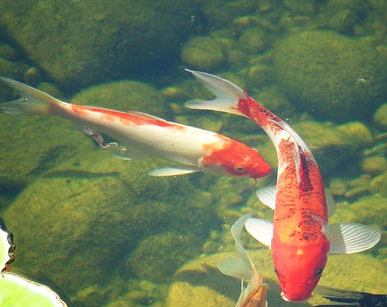
Scientific Name: Cyprinus carpio
Common Name: Koi Carp
Colouration: White, black, red, orange, yellow, blue, and cream coloured.
Feeding: Small bugs, insects, plants and algae
Breeding season: May and June – in late spring and early summer
Life span: 25-35 Years
Behavior:
- Act differently when they’re stressed
- Hate quick changes
- Under stress they speed around the pond or act sluggish
Advantages:
- Friendly fish
- Social fish that enjoy living in groups
- Will not eat other fish or fight with each other
- Fighter Fish

Scientific Name: Betta splendens
Common Name: Fighter fish
Colouration: Vibrant gold, reds, blues, greens and violets
Feeding: Brine shrimp, dried bloodworms or daphnia
Breeding season: Breeds in the age of 14 months
Life span: 3-5 Years
Behavior:
- Highly aggressive
- Males are very notorious fighters
- They live in warm water of 75-80 degrees
Advantages:
- They are easy to take care
- Very beautiful and unique-looking fish
- Have brightly colored bodies and long, flowing fins which provides extra beauty
- Platy Fish
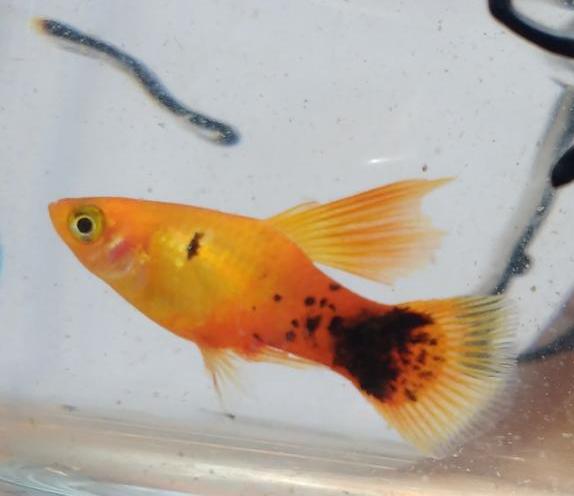
Scientific Name: Xiphophorus maculatus
Common Name: Platy fish
Colouration: White, black, red, orange, yellow, blue.
Feeding: Need a good mix of plant based food and proteins.
Breeding season: Instantly when the temperature is about 64°F
Life span: 3-4 Years
Behavior:
- Very peaceful and great community lover
- Very active and love being in groups
- They are live bearing fish, as they give birth to live young fish
Advantages:
- Great interactive fish
- Easy to care
- Can adapt to very hard water
- Very calm and peaceful fish
- Tank Cleaner Fish
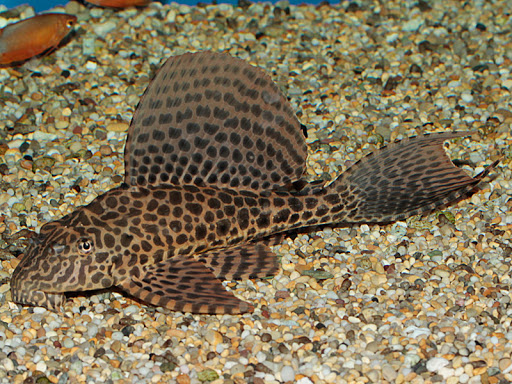
Scientific Name: Plecostomus
Common Name: Tank Cleaner Fish
Colouration: Brownish Black, Greenish black.
Feeding: Food left over by other fish, Pellets, Brine Shrimp, Blood Worm, Tubifex and Daphnia.
Breeding season: June to July
Life span: More than 15 Years
Behavior:
- They become active at daytime
- Fish prefers a school of 5-6 fishes
- They are not aggressive
Advantages:
- Peaceful ground species
- They are excellent tank cleaners
- Molly Fish

Scientific Name: Poecilia sphenops
Common Name: Molly Fish
Colouration: White, black, Orange
Feeding: Flakes, pellets, and frozen foods
Breeding season: When temperature is at 70-82 °F
Life span: 5 Years
Behavior:
- Can live in either salt or freshwater
- Love to dwell in densely planted aquariums
- Mid-level swimmers
- Small peaceful species adapt well to a variety of water conditions
Advantages:
- Never aggressive
- Easiest variety to breed
- Reproduce extremely quickly
- Guppies
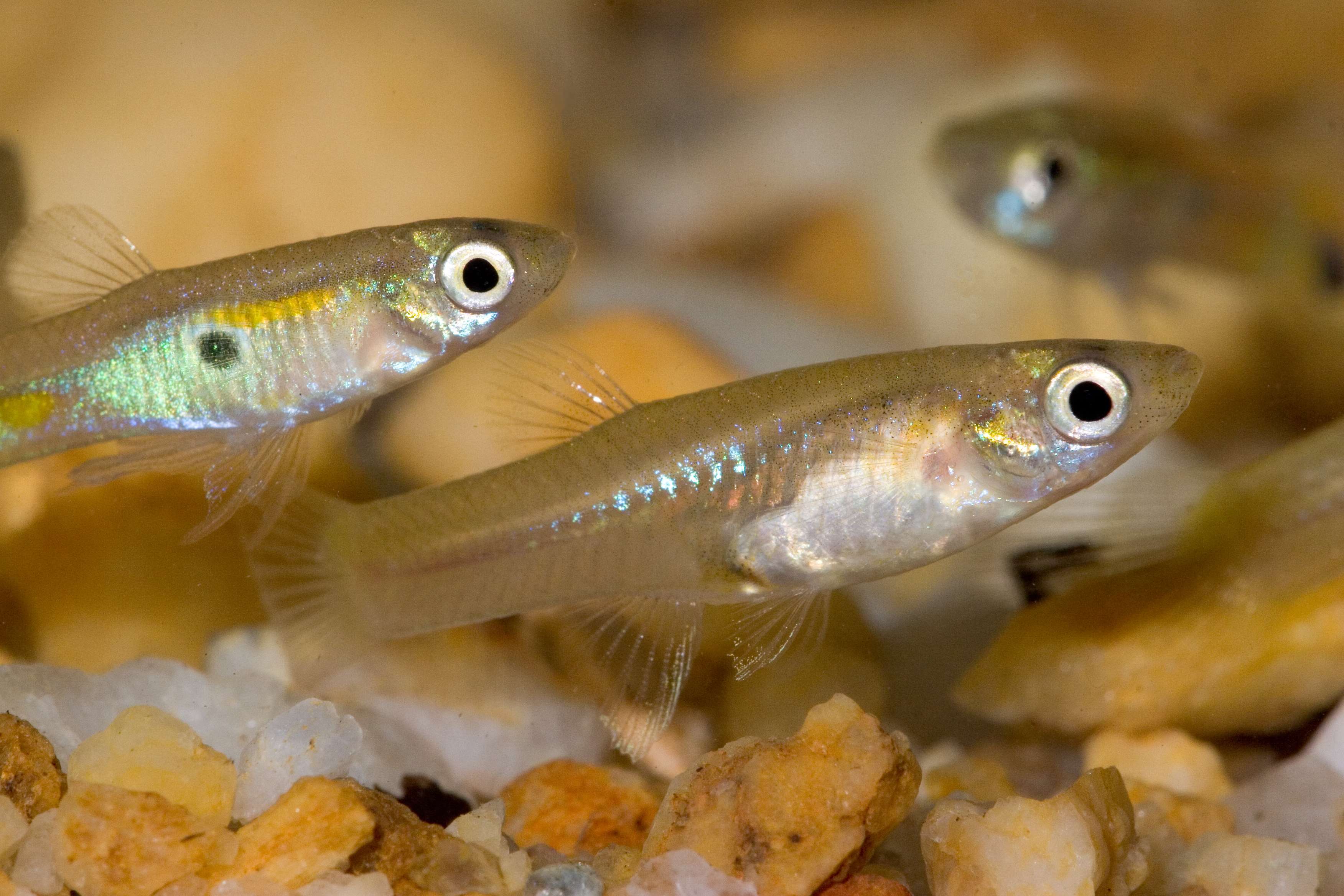
Scientific Name: Poecilia reticulata
Common Name: Guppy
Colouration: Fluorescence colour, orange
Feeding: Feeds algae and aquatic insect larvae.
Breeding Season: Summer, January to May
Life span: 1 to 3 years
Behaviour:
- It is a peaceful fish that like to be kept in groups.
- They are active swimmers
- It move around all the time and lot of pretty
- The males chasing the females trying to impress them by wiggling their fins.
Advantages:
- They are small and cheap.
- The males are smaller and flashier than the females, but the females still sport colorful tails.
- Guppies are incredibly easy to keep alive
- They are great for mosquito control.
- Swordtail

Scientific Name: Xiphophorous hellerii
Common Name: Sword tail
Colouration: Red, Black, Red Simpson, Spotted red and green
Feeding: Bloodworms, daphnia, brine shrimp, mosquito larvae, or fruit flies, algae
Breeding Season: 22°C – 28°C
Life span: 3-5 years
Behaviour:
- They can take care of themselves when there are bigger fishin the tank.
- The males may become aggressive towards other males.
- They should be able to handle themselves with many fishtheir same size or larger.
Advantages:
- It has been used extensively in genetic studies and medical research.
- Zebra Fish

Scientific Name: Danio rerio
Common Name: Zebra Fish
Colouration: Blue, yellow, purple, white with stripes
Feeding: Brine shrimp larvae, tubifex worms
Breeding Season: During dawn at a temperature of about 23º and 28ºc
Life span: 3-5 Years
Behaviour:
- Active Swimmers
- Become stressed if their numbers are too low
- They are known to jump so you may want to keep your tank covered
- Tend to be so zippy and lively
Advantages:
- They are very easy to care
- They are prized for their instantly striped pattern
- Arowana
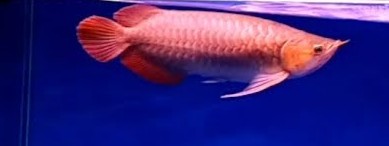
Scientific Name: Osteoglossidae
Common Name: Arowana
Colouration: Gold-tinged to deep red, dark brown.
Feeding: Live or frozen fish and insects, krill, worms and shrimp
Breeding Season: August to October
Life span: 10 – 15 Years
Behaviour:
- Can survive in areas with less oxygen
- Mostly surface dwelling
- Solitary predators
Advantages:
- Considered a symbol of luck, strength, prosperity, and wealth
- Body structure gives them a drastically different appearance


